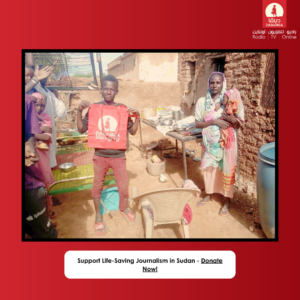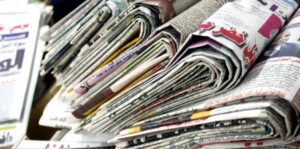Sudan’s journalists condemn Govt. harassment
The Sudanese Journalists’ Network has condemned the harassment of journalists following the popular movement that led to widespread student protests in Khartoum, and rippled across the country last week.
The Sudanese Journalists’ Network has condemned the harassment of journalists following the popular movement that led to widespread student protests in Khartoum, and rippled across the country last week.
The Network has confirmed that the country is “going through a boiling popular movement that requires male and female journalists to stand by the people's choice and raise their awareness”.
Journalist Khaled Fathi expressed concern at the dismissal of journalists who defend freedoms and journalists’ rights. He added that “the government is capable of harming journalists through advertisements, confiscation and economic sanctions.
He said that these measures are designed by the government “to force the independent newspapers to advocate for the government through incorporation of other newspapers, so as to guarantee much more manipulation”.
The Security Apparatus has instructed the newspapers not to publish or cover news about the recent student demonstrations in Khartoum.
Newspapers and journalists have been strictly ordered not to publish news regarding the murder of a student from El Ahilya University on the pretext that the case is pending investigation.
The instructions entailed direct and indirect threats and that the universities will not be closed unless there is an utmost necessity for securing the properties.
Press freedom
Sudan ranks an unenviable 174th out of 180 in the 2016 World Press Freedom Index, published by Reporters Without Borders on 20 April.
The Index publishers point out that Omar Al Bashir, Sudan’s president since 1989, “has been indicted by the International Criminal Court for crimes against humanity and his country ranks near the bottom of the press freedom index. The National Intelligence and Security Service (NISS) hounds journalists and censors the print media, above all by closing down newspapers, such as the daily Al Tayar in December 2015, or by confiscating entire newspaper issues as they come off the press. Journalists are subjected to interminable judicial proceedings with potentially long jail sentences.”
UN Expert
On Thursday, the UN Independent Expert on the Situation of Human Rights in the Sudan, Aristide Nononsi, concluded a visit to Sudan. Examining press freedom violations was one of the items on the agenda for his visit.
In his report, the UN Expert notes: “I would also like to express concern about ongoing censorship of newspapers, and increased restrictions on journalists from freely expressing their opinion. In view of the ongoing political dialogue, it is imperative that restrictions on the rights to freedom of expression and association be removed in order to create a conducive environment for a free and inclusive national dialogue. In this context, the suspension by NISS of the Al-Tayar newspaper since mid-December 2015 is of concern. I have raised this case with the authorities, and I strongly recommend that the appeal of Al-Tayar newspaper against NISS’ decision to suspend its operations is guaranteed an independent judicial review along with provision of adequate compensation.”











 and then
and then